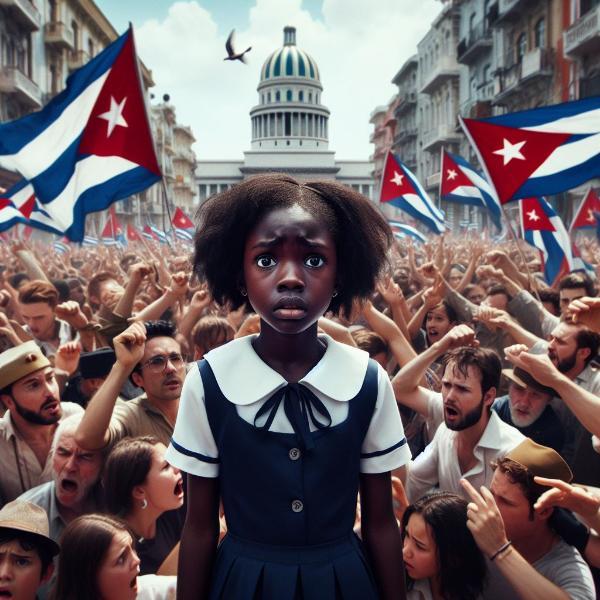A searing tropical sun was approaching its zenith in the blue sky of Havana, but hardly any light had made it through the tiny, curtained window of my dingy room. The antiquated wall fan was whirring madly, pointed firmly over my prostrated body, but I was drenched in sweat all the same. I was just beginning to wake up and become aware of my mild hangover.
Half-sleepingly, I tried to recollect my last night’s memories: Latin tunes, pretty female faces, rum effluvium… there wasn’t much more than that. I needed a cold shower and a strong dose of caffeine. After the third cup, I got hungry.
I threw some clothes on me and hit the streets in search of a belated breakfast. I meandered a bit around the busy, torrid streets of Habana Nueva district until I caught a whiff of freshly-baked pastry. A little bakery-cafe was wedged in the corner of a narrow alley – one of the still scarce private enterprises that had begun to pop up after the then-recent economic reforms. I stepped in.
An intelligent-looking, elderly, black woman nailed a raring gaze at me upon my entry. She was the place’s only customer, sat at the cornermost table over a long-empty cup of coffee. She curiously attended my advance towards the display case. Various tempting treats lay in there, but I was most attracted by that fluffy and melty pizza.
“Cuanto por una rebanada?” I asked the girl behind the counter in my broken Spanish.
“50 pesos,” she replied, understanding that I’m a foreigner and attempting to rip me off big.
“Ohoho,” I snarled. “Me refiero al precio normal.”
“Es 2 pesos,” the woman behind me then chimed in to provide the answer.
“Gracias,” I said, briefly turning around to face her.
Back to the cashier: “Entonces, si es 2 por una, sería 4 por dos, correcto?” I inquired, displaying the numbers with my fingers.
She nodded yes, and I requested my two pizza slices served. I paid and turned around, intent on leaving to eat outside, but my intention was hampered by the old woman who had meanwhile broken out into hearty laughter.
“Good math,” she pronounced, between her laughing bursts, in unmistakably American-accented English. “Will you have a seat?” she invited me to her table when she managed to restrain her merriment.
I wasn’t accustomed to running into foreigners, and especially Americans, in this part of the town. I was actually missing a proper conversation in a language I knew well, plus that she seemed to make for an agreeable company. So I welcomed her invitation rather earnestly.
“Would you like a coffee?” she offered no sooner than I sat down.
“Well, I’ve had three already, but a fourth one wouldn’t do any more harm.”
She raised her arm assertively and ordered two cups in a perfectly Cuban accent.
“Are you American?” I asked her with a tinge of uncertainty.
“I used to be,” she replied curtly. “I’m Cuban now, since a long time.”
She registered my confounded stare and explained further: “I was born in the USA by American parents, but I was raised in Cuba by Cuban parents.”
She kissed off a question that was just about to form on my lips and changed the topic to me. I answered a few questions about my situation perfunctorily, and I eventually managed to revert to the more intriguing subject of how she’d ended up there. Over the next hour or so, she narrated the gist of her peculiar life story…
She was born in Alabama to African American parents in 1944. Her mother passed away shortly after her birth, and she was placed in an orphanage while her father was serving the army in Europe. After his return, she was taken under his care and grew up as a military brat in different bases around the States. They finally moved to Guantanamo in 1955.
One day in 1958, amidst the culmination of the civil war, her father brought her to a Cuban family in a nearby village and left her there. He assuaged her sobs with promises of return, but he never returned. Did he abscond out of fear of the revolution…? Did he renegade to join the revolutionaries…? Did he simply elope with some Cuban woman…? Did he remain alive for long or short after his disappearance…? She never got to know.
It didn’t take her long to forget her roots. Her new family tending to her more lovingly than her father ever had significantly expedited the progress of oblivion. She got fully integrated into her novel society and lived in the village until her mid-twenties. Then she got married, moved to Havana, got a job as an English teacher, and had many children and grandchildren. She never left the island.
“Did you never wish to return to your homeland?” I wondered.
“What for? To begin with, it would be bureaucratically complicated, if not impossible; I didn’t have any document proving my origins. I was registered in the census under the new regime. For what the state is concerned, I am a Cuban. If it wasn’t for my husband, I wouldn’t be permitted to even move to the capital, let alone the United States.
“And then, why would I want to go there anyway? In the years before I got married, blacks in my home state were water-cannoned and batoned to death. Here, I may have been poor, but at least I am treated like a human being.”
“Do you then approve of the Communist regime?” I whispered cautiously, glancing sidelong.
“Approve? Of course not,” she said in unaltered volume. “They’re but a bunch of corrupt rascals – just like all politicians are – but they here are even worse, being left completely unchecked. And Fidel is the chief villain; nothing in this country is going to change for the better before he dies.”
Somewhat shocked, I exigently surveyed the surrounding space, looking for ears on the walls. I had never up to that point heard anyone in this country criticizing the regime so openly in a public area. No-one would even refer to the leader by his name publicly. They would instead mumble “el Abuelo” or discreetly rub their chin to denote him.
“Are you not afraid to express that?” I asked her.
“I’m not afraid of anyone or anything. I have lived my years. Everybody in this neighborhood knows who Reina is and respects her,” she exclaimed, puffed with pride…
With that engaging chat, the time passed quickly. She offered to treat me to one more cup of coffee, but I had to refuse as I was waited for in the city center. Instead, she gave me her phone number and asked me to join her son’s birthday party that was to take place in a few days.
I gladly accepted her invitation and got to meet her entire family. None of them spoke the slightest English. They were but a typical Cuban family, only distantly aware of the American origin of their progenitor.
A few more days later, we met again for the last time. She helped me to rent a car to travel to the east of the country. We bid each other a warm farewell, and I stared at her waving a hand in my rearview mirror.
The story you've just read is a part of my "Real Stories of Real People" collection, wherein I narrate my encounters with various remarkable characters I've run into while traveling around the world. The entire collection is published on my blog and may be read here. But if you'd like to get them with you to the beach in your ebook reader or as a physical book, and very appreciatedly support my creative activity, go ahead and grab your copy from Amazon for the cost of a cup of coffee.

